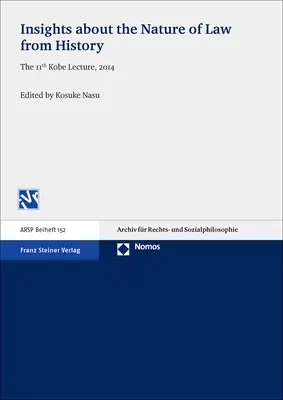Insights about the Nature of Law from History: The 11th Kobe Lecture, 2014Paperback, 7 March 2017

Qty
1
Turbo
Ships in 2 - 3 days
Only 3 left
Free Delivery
Cash on Delivery
15 Days
Free Returns
Secure Checkout

Part of Series
Archiv Fur Rechts- Und Sozialphilosophie - Beihefte
Print Length
146 pages
Language
English
Publisher
Franz Steiner Verlag Wiesbaden GmbH
Date Published
7 Mar 2017
ISBN-10
3515115706
ISBN-13
9783515115704
Description
Product Details
Book Format:
Paperback
Country of Origin:
US
Date Published:
7 March 2017
ISBN-10:
3515115706
ISBN-13:
9783515115704
Language:
English
Location:
Stuttgart
Pages:
146
Publisher: